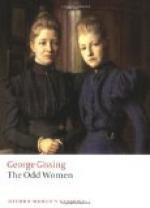It was seldom that either of them ailed anything. Mildred still showed traces of her country breeding; she was the more robust, walked with a heavier step, had less polish of manner. Under strain of any kind Winifred’s health would sooner give way, but her natural vivacity promised long resistance to oppressing influences. Mildred had worked harder, and amid privations of which the other girl knew nothing. She would never distinguish herself, but it was difficult indeed to imagine her repining so long as she had her strength and her congenial friends. Twenty years hence, in all probability, she would keep the same clear, steady eye, the same honest smile, and the same dry humour in her talk. Winifred was more likely to traverse a latitude of storm. For one thing, her social position brought her in the way of men who might fall in love with her, whereas Mildred lived absolutely apart from the male world; doubtless, too, her passions were stronger. She loved literature, spent as much time as possible in study, and had set her mind upon helping to establish that ideal woman’s paper of which there was often talk at Miss Barfoot’s.
In this company Rhoda felt her old ambitions regaining their power over her. To these girls she was an exemplar; it made her smile to think how little they could dream of what she had experienced during the last few weeks; if ever a moment of discontent assailed them, they must naturally think of her, of the brave, encouraging words she had so often spoken. For a moment she had deserted them, abandoning a course which her reason steadily approved for one that was beset with perils of indignity. It would shame her if they knew the whole truth—and yet she wished it were possible for them to learn that she had been passionately wooed. A contemptible impulse of vanity; away with it!
There was a chance, it seemed to her, that during Miss Barfoot’s absence Everard might come to the house. Mary had written to him; he would know that she was away. What better opportunity, if he had not dismissed her memory from his thoughts?
Every evening she made herself ready to receive a possible visitor. She took thought for her appearance. But the weeks passed by, Miss Barfoot returned, and Everard had given no sign.
She would set a date, a limit. If before Christmas he neither came nor wrote all was at an end; after that she would not see him, whatever his plea. And having persuaded herself that this decision was irrevocable, she thought it as well to gratify Miss Barfoot’s curiosity, for by now she felt able to relate what had happened in Cumberland with a certain satisfaction—the feeling she had foreseen when, in the beginning of her acquaintance with Everard, it flattered her to observe his growing interest. Her narrative, to which Mary listened with downcast eyes, presented the outlines of the story veraciously; she told of Everard’s wish to dispense with the legal bond, of her own indecision, and of the issue.




